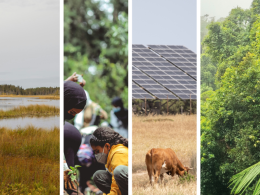A coalition of 55 concerned organisations has issued an open letter to the Bursa Carbon Exchange (BCX), Malaysia, urging the suspension of renewable energy credits (RECs) linked to the Murum Dam in Sarawak. The BCX, which aims to assist national and corporate efforts to achieve net-zero greenhouse gas (GHG) emissions by 2050, is reportedly planning to auction these RECs despite serious concerns about the project’s environmental and human rights impacts.
The letter highlights several key issues associated with the Murum Dam. The letter claims that the construction of the Murum Dam, undertaken by Sarawak Energy Berhad (SEB) between 2008 and 2015, led to the deforestation of 24,500 hectares of forest—an area comparable to Wilayah Persekutuan Kuala Lumpur. This deforestation has adversely affected the habitats of critically protected species such as the Silvered Leaf Monkey and Bornean Gibbon.
According to the coalition, the project displaced over 1,400 Indigenous Penan and Kenyah villagers without their free, prior, and informed consent (FPIC). Reports indicate that this displacement has led to significant disruptions in their traditional lifestyles, with challenges including poor living conditions, insufficient infrastructure, and adverse environmental impacts affecting their ability to sustain traditional practices.
The letter accuses SEB of poor governance practices, noting that construction began before legal and environmental assessments were completed and made publicly available. Resettlement plans were also delayed and inadequately communicated to affected communities.
Furthermore, the deforestation associated with the dam released approximately 9 million tons of CO2e.
The letter also accuses the Murum Dam REC lacks transparent documentation, with no public technical details or descriptions available from SEB, I-REC, or other sources, questioning the credibility of the project.
The letter questions the efficacy of RECs, arguing that they are a hypothetical measure that does not necessarily translate into real carbon emission reductions. The Murum Dam’s REC, issued nine years after the dam’s construction, does not incentivise additional renewable energy capacity or alter emissions profiles, as highlighted by a 2022 Nature study on REC effectiveness.
The coalition asserted that mega-dams linked to Indigenous rights violations, biodiversity destruction, and lack of transparency do not contribute to meaningful climate solutions. They emphasised the urgency of maintaining the 1.5-degree Celsius climate target and called for the immediate suspension of the Murum Dam REC and other questionable projects from the BCX.















